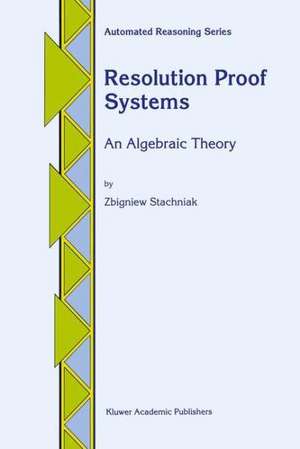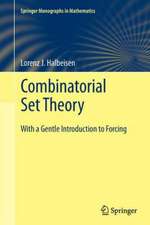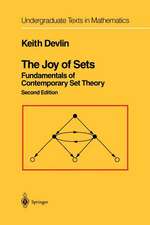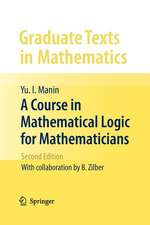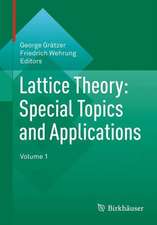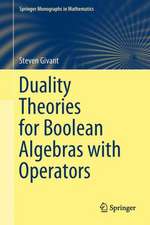Resolution Proof Systems: An Algebraic Theory: Automated Reasoning Series, cartea 4
Autor Z. Stachniaken Limba Engleză Paperback – oct 2011
A new class of logical calculi, the class of resolution logics, emerges as a second theme of the book. The logical and computational aspects of the relationship between resolution logics and resolution proof systems is explored in the context of monotonic as well as nonmonotonic reasoning.
This book is aimed primarily at researchers and graduate students in artificial intelligence, symbolic and computational logic. The material is suitable as a reference book for researchers and as a text book for graduate courses on the theoretical aspects of automated reasoning and computational logic.
| Toate formatele și edițiile | Preț | Express |
|---|---|---|
| Paperback (1) | 642.19 lei 6-8 săpt. | |
| SPRINGER NETHERLANDS – oct 2011 | 642.19 lei 6-8 săpt. | |
| Hardback (1) | 648.44 lei 6-8 săpt. | |
| SPRINGER NETHERLANDS – 30 apr 1996 | 648.44 lei 6-8 săpt. |
Preț: 642.19 lei
Preț vechi: 802.74 lei
-20% Nou
Puncte Express: 963
Preț estimativ în valută:
122.90€ • 127.83$ • 101.46£
122.90€ • 127.83$ • 101.46£
Carte tipărită la comandă
Livrare economică 14-28 aprilie
Preluare comenzi: 021 569.72.76
Specificații
ISBN-13: 9789401072519
ISBN-10: 9401072515
Pagini: 228
Ilustrații: XVI, 208 p.
Dimensiuni: 160 x 240 x 12 mm
Greutate: 0.33 kg
Ediția:Softcover reprint of the original 1st ed. 1996
Editura: SPRINGER NETHERLANDS
Colecția Springer
Seria Automated Reasoning Series
Locul publicării:Dordrecht, Netherlands
ISBN-10: 9401072515
Pagini: 228
Ilustrații: XVI, 208 p.
Dimensiuni: 160 x 240 x 12 mm
Greutate: 0.33 kg
Ediția:Softcover reprint of the original 1st ed. 1996
Editura: SPRINGER NETHERLANDS
Colecția Springer
Seria Automated Reasoning Series
Locul publicării:Dordrecht, Netherlands
Public țintă
ResearchCuprins
1 Logical Preliminaries.- 1.1 Logical Systems.- 1.2 Refutational Principle.- 1.3 Propositional Logics — Syntax.- 1.4 Propositional Logics — Semantics.- 1.5 Semantic Trees.- 1.6 First-Order Logics.- 1.7 Herbrand’s Theorem.- 2 Propositional Resolution Proof Systems.- 2.1 Resolution Principle.- 2.2 Resolution Proof Systems.- 2.3 Deductive Process.- 2.4 Resolution Logics.- 2.5 Resolving Upon Subformulas.- 2.6 Strong Resolution Counterparts.- 3 Propositional Resolution Logics.- 3.1 Matrices Induced by Resolution Proof Systems.- 3.2 Characterization of Resolution Logics.- 3.3 Disjunctive Resolution Logics.- 3.4 Relative Soundness of the Resolution Rule.- 3.5 Lattices of Resolution Logics.- 4 Efficiency of the Deductive Process.- 4.1 Minimal Resolution Counterparts.- 4.2 Verifier Degrees of Resolution Logics.- 4.3 Minimal Resolution Counterparts of ?ukasiewicz Logics.- 4.4 Simplification of the Resolution Rule.- 4.5 Simplification of the Termination Test.- 5 Theorem Proving Strategies.- 5.1 Set of Support Strategy.- 5.2 Polarity Strategy.- 5.3 Operator Polarity.- 5.4 Unrestricted Polarity.- 5.5 Verifier Polarity.- 5.6 Strengthening the Polarity Strategy.- 5.7 Polarity and the Simplification of Resolvents.- 5.8 Polarity and the Deductive Process.- 5.9 Test Results.- 6 Resolution Circuits.- 6.1 Propositional AND-OR Circuits.- 7 First-Order Resolution Proof Systems.- 7.1 Unification.- 7.2 Resolution Counterparts of FFO Logics.- 7.3 Existence of Resolution Counterparts.- 7.4 Theorem Proving Strategies.- 7.5 Resolution Circuits for FFO Logics.- 8 Nonmonotonic Resolution Inference Systems.- 8.1 Cumulative Inference Systems.- 8.2 Preferential Matrices.- 8.3 Monotone Bases of Inference Operations.- 8.4 Consistency Preservation.- References.- Index of Symbols.
